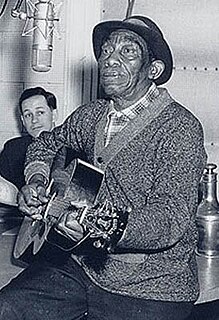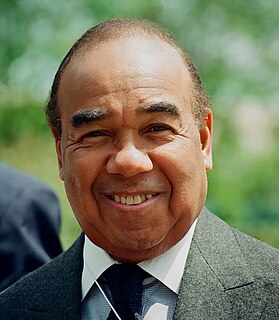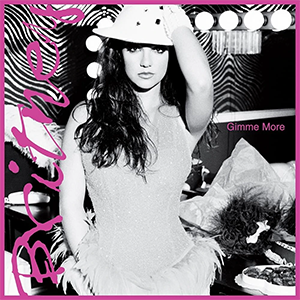
John Smith Hurt, better known as Mississippi John Hurt, was an American country blues singer and guitarist.

Bessie Smith was an American blues singer widely renowned during the Jazz Age. Nicknamed the "Empress of the Blues", she was the most popular female blues singer of the 1930s. Inducted into the Rock and Roll Hall of Fame in 1989, she is often regarded as one of the greatest singers of her era and was a major influence on fellow blues singers, as well as jazz vocalists.

Delores LaVern Baker was an American R&B singer who had several hit records on the pop chart in the 1950s and early 1960s. Her most successful records were "Tweedle Dee" (1955), "Jim Dandy" (1956), and "I Cried a Tear" (1958).

Spoon is an American rock band from Austin, Texas, consisting of members Britt Daniel, Jim Eno (drums), Alex Fischel, Gerardo Larios and Ben Trokan. The band was formed in Austin in October 1993 by Daniel and Eno. Critics have described the band's musical style as rock, pop, art rock, and experimental rock.

Robert Waltrip Short was an American cabaret singer and pianist, who interpreted songs by popular composers from the first half of the 20th century such as Rodgers and Hart, Cole Porter, Jerome Kern, Harold Arlen, Richard A. Whiting, Vernon Duke, Noël Coward and George and Ira Gershwin.
Beryl Audley Bryden was an English jazz singer, who played with Chris Barber and Lonnie Donegan. Ella Fitzgerald once said of Bryden that she was "Britain's queen of the blues".

Metallic K.O. is a live recording by American hard rock band The Stooges. In its original form, the album was purported to contain the last half of a performance at the Michigan Palace in Detroit, on February 9, 1974—the band's final live performance until their reformation in 2003. The performance was notable for the level of audience hostility, with the band being constantly pelted with pieces of ice, eggs, beer bottles and jelly beans, among other things, in response to Iggy Pop's audience-baiting.
Classic female blues was an early form of blues music, popular in the 1920s. An amalgam of traditional folk blues and urban theater music, the style is also known as vaudeville blues. Classic blues were performed by female singers accompanied by pianists or small jazz ensembles and were the first blues to be recorded. Ma Rainey, Bessie Smith, Ethel Waters, and the other singers in this genre were instrumental in spreading the popularity of the blues.

Indestructible! is a 2006 studio album by the American jazz singer Anita O'Day. It was O'Day's final recording.

Nina Simone with Strings is an album by Nina Simone. The album was released after she had left Colpix Records. The tracks on the album were assembled by combining unreleased material with recordings of strings.

Forbidden Fruit is an album by the jazz singer/pianist/songwriter Nina Simone. It was her second studio album for Colpix. The rhythm section accompanying her is the same trio as on both live albums before and after this release.

"Stolen Moments: The Lady Sings... Jazz and Blues" is a 1993 live album by Diana Ross released on the Motown label.

"Gimme More" is a song by American singer Britney Spears from her fifth studio album, Blackout (2007). It was released on August 31, 2007, by Jive Records, as the lead single from the album. "Gimme More" was recorded in 2006 during Spears' second pregnancy and was one of the first solo productions by Danja. The song opens with an intro in which Spears utters the phrase "It's Britney, bitch". Musically, "Gimme More" is a song with elements from dance-pop, electropop and EDM using breathy vocals. The track closes with a speak-sing outro by Danja.
"Now or Never" is a jazz song written by singer Billie Holiday, and composer Curtis Reginald Lewis.
Frankie Newton was an American jazz trumpeter from Emory, Virginia, United States. He played in several New York City bands in the 1920s and 1930s, including those led by Sam Wooding, Chick Webb, Charlie Barnet, Andy Kirk and Charlie "Fess" Johnson. In the 1940s, he played with bands led by Lucky Millinder and Pete Brown. He played in clubs in New York and Boston, with musicians such as pianist Art Tatum, pianist James P. Johnson, drummer Sid Catlett and clarinetist Edmond Hall.
Coot Grant was an American classic female blues, country blues, and vaudeville singer and songwriter. On her own and with her husband and musical partner, Wesley "Kid" Wilson, she was popular with African American audiences from the 1910s to the early 1930s.
Wesley Shellie Wilson, often credited as Kid Wilson, was an American blues and jazz singer and songwriter. His stagecraft and performances with his wife and musical partner, Coot Grant, were popular with African American audiences in the 1910s, 1920s and early 1930s.

Judith Durham and The Hottest Band in Town is the fourth studio album from Australian recording artist Judith Durham. The album was Durham's first released via Pye Records in June 1974.
"Need a Little Sugar in My Bowl" is a dirty blues song first recorded in 1931 by Bessie Smith and released by Columbia Records. It was written by Clarence Williams, J. Tim Brymn, and Dally Small. Owing to its sexually suggestive lyrics, it has been rated as one of the best double entendre songs of all time. In 1967, Nina Simone released "I Want a Little Sugar in My Bowl", which referenced lyrics from the original 1931 song.
Can't Keep It to Myself is an album by the American gospel singer Marion Williams, released in 1993. It was Williams's last album. A few months prior to the release of the album, Williams had become the first singer to win a MacArthur Award.












